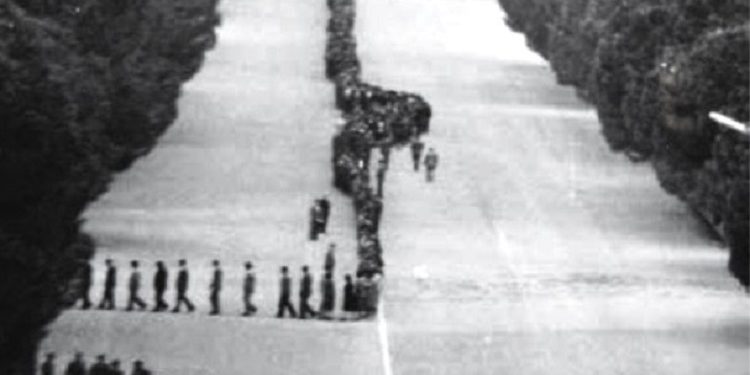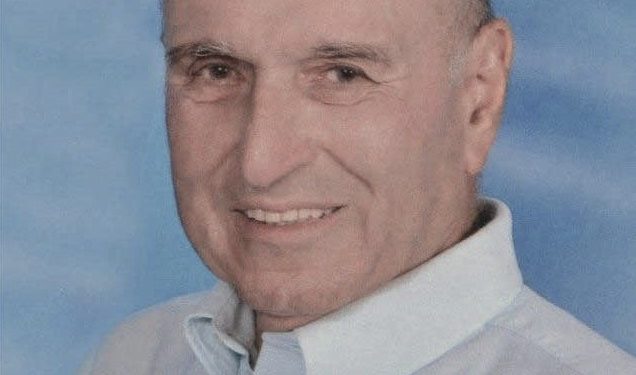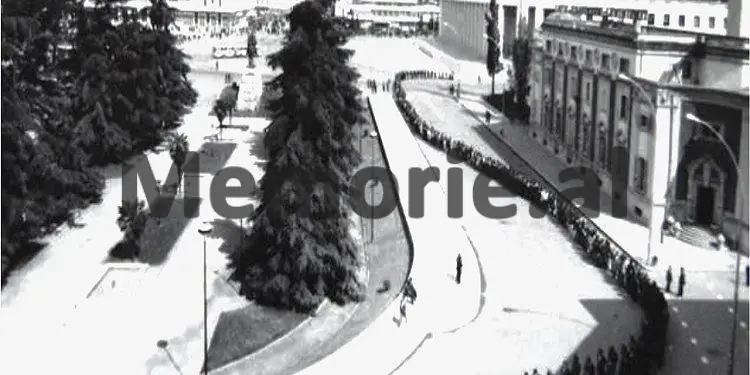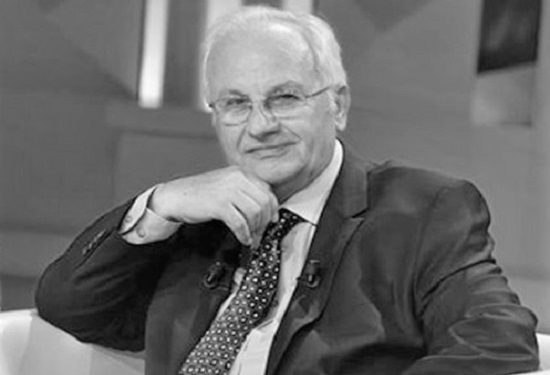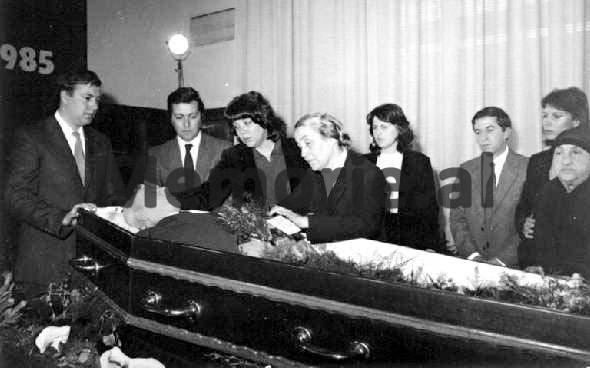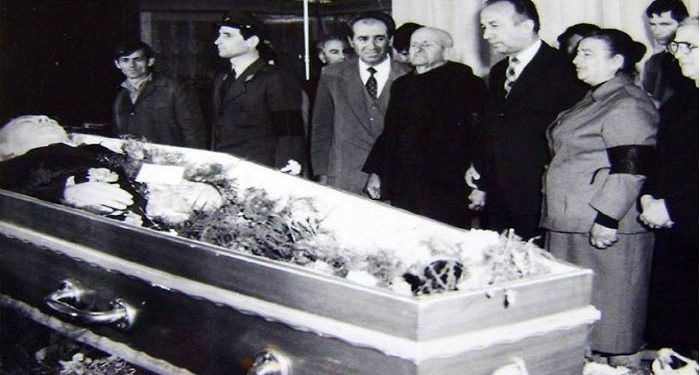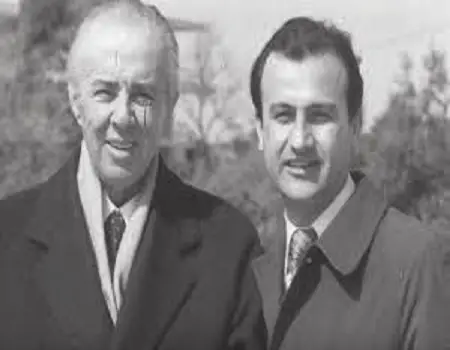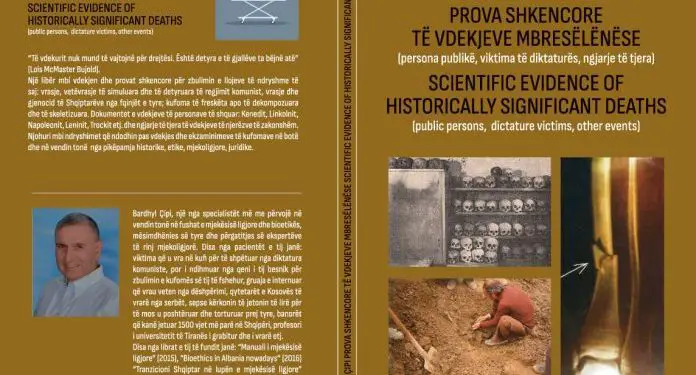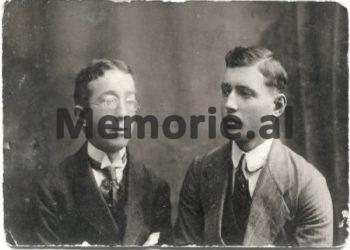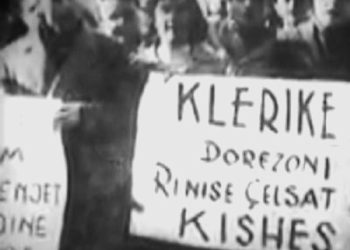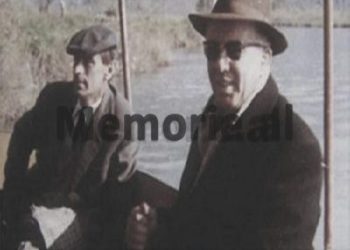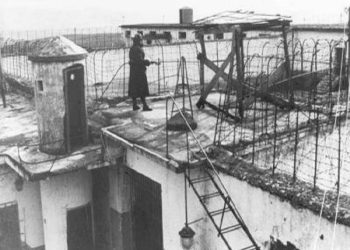By Prof. Dr. Bardhyl Çipi
Part Three
Prof. Çipi: “According to Prof. Sabit Brokaj, who was part of the medical team, and based on his experience with such patients, Enver Hoxha was…”!
SCIENTIFIC EVIDENCE OF NOTABLE DEATHS
(Public figures, victims of the dictatorship, other events)
Memorie.al / Bardhyl Çipi are one of the most experienced specialists in our country in the field of Forensic Medicine and Bioethics, their teaching, and the training of new forensic experts. Some of his cases involve patients who are: victims murdered at the border while trying to escape the communist dictatorship, but aided by his loyal dog in the discovery of his hidden corpse; the interned woman who committed suicide out of despair; citizens of Kosovo killed by the Serbs because they sought to live freely, not to be humiliated and tortured by them; residents who lived in Albania 1500 years ago; a University of Tirana professor who was robbed and murdered, etc. A book about death and the scientific evidence for uncovering its various types: murder, suicide, those stimulated and forced by the communist regime, murders and genocides against Albanians by their neighbors, fresh or decomposed and skeletal remains. Documentation of the deaths of prominent figures: Kennedy, Lincoln, Napoleon, Lenin, Trotsky, etc., and other events involving the deaths of ordinary people. Knowledge about the changes that occur after death and the examination of corpses worldwide and in our country, from a historical, ethical, forensic, and legal standpoint. Some of his recent books are: “Manuali i Mjekësisë Ligjore” (Forensic Medicine Manual, 2015), “Bioethics in Albania nowadays” (2016), “Tranzicioni shqiptar në lupën e mjekësisë ligjore” (Albanian Transition through the Lens of Forensic Medicine, 2018), “Mjekësia Ligjore Kriminalistika” (Forensic Medicine and Criminology, 2020).
Continued from the previous issue
Medical Confidentiality in General and After the Death of the Patient and Public Figures
The same reasoning can be applied to the case of Lord Moran, who published his book after the patient’s death, mainly regarding the treatment of Churchill, without discrediting the deceased (Robitscher, 1968). Such examples are countless in medical literature (Robitscher 1968; Piédelièvre, 1966):
-The case of Marat, one of the leaders of the French Revolution in 1789, who was murdered while bathing, but whose physician revealed that he suffered from dermatitis (skin infection) of the scrotum and perineum. The bath provided him relief from the disease he suffered from. This made the assassination easier.
-The case of the physician who compiled medical reports on the progression of Napoleon’s illness and his behavior before he died.
-The cases of the illnesses and deaths of many US presidents, etc.
Medical Confidentiality in Albania
The issue of medical confidentiality in our country is outlined in the Code of Medical Ethics and Deontology, which contains Article 22 (preservation of medical confidentiality) and Article 23 (disclosure of medical confidentiality).
Thus, according to these articles, a doctor’s medical secret constitutes a very important principle, but it is not absolute, as it may be disclosed when the patient’s life is at risk or when required by law.
Therefore, the non-observance of medical confidentiality, when required by law, is also stipulated in the Code of Criminal Procedure of our country. According to Article 282 (report by medical personnel), medical personnel who perform treatment and suspect it is related to a criminal act are obliged to report it to the prosecutor’s office (Code of Criminal Procedure of the Republic of Albania, 1995).
Some time ago, in application of this article of the criminal procedure, two doctors and a nurse in Fier were arrested on criminal charges of “failure to report a crime” and “actions obstructing the discovery of the truth” (Top Channel, 2022).
This was because they had treated a person sought by the justice system following his involvement in a shootout in a village near Elbasan. Thus, in this case, they had not implemented Article 282 of the Code of Criminal Procedure, according to which they were obliged to report the treatment they had performed on this person to the justice authorities.
Post-Mortem Medical Confidentiality of Public Figures
The issue of post-mortem medical confidentiality is only briefly mentioned in the Code of Medical Ethics and Deontology (2012) in our country, specifically in the second paragraph of Article 22 (preservation of the secret):
“……..Even after the death of the patient, with the exception of cases where it (the medical secret) poses a risk to the health and life of others, the doctor must not disclose professional secrecy.”
As can be seen, this issue is addressed very little in Albanian medical legislation. Therefore, for these cases, especially for public figures, which have begun to be analyzed here as well, the rules recommended by foreign literature, some of which were presented earlier in this study, should be applied.
I have personally participated in several forensic death cases, the results of which I have announced and published in the press, thus not maintaining medical confidentiality, but without violating the specific rules of these cases (B. Çipi, 2018).
-Thus, in several publications regarding the deaths of Mehmet Shehu and Nako Spiru, which fall into the category of criminal deaths and as such will be considered cases where the post-mortem secret is not maintained. However, before publishing, I also obtained the permission of their family members (Çipi B., Çipi S. 2015; Çipi, 2018, 2020;).
-The issue of the victims of the bomb in the Soviet embassy in Tirana in 1951 also constitutes a criminal case where there was no need to maintain medical confidentiality; for this matter, I also obtained permission from the victims’ family members, who also assisted in their discovery and examination.
-In the case of the exhumation of Enver Hoxha in 1992, which I directed, its publication in the 2000s was done to refute the slander published at that time, according to which, during the exhumation, the corpse was struck on the head and damaged by the crane’s cable that was lifting it out. For this publication, I also had the support of one of Enver Hoxha’s family members.
Regarding the data on Enver Hoxha’s medical follow-up, the following publications can be mentioned:
-The notes on Enver Hoxha’s medical follow-up left by Prof. Dr. Fejzi Hoxha (published after his death by Prof. Dr. Lluka Heqimi, in 2003): a contemporary of his from Gjirokastra who had known Enver Hoxha since childhood and had treated him, despite the difficulties of this treatment, for a very long time (Heqimi, 2003).
The publication of these notes, after the death of their author, constitutes one of those cases where medical confidentiality may not be maintained for highly known public figures. In addition to him, Hoxha’s other doctor, Prof. Dr. Sabit Brokaj, one of the doctors in the team that monitored Enver Hoxha’s health 24 hours a day, also commented on his treatment.
According to him, Hoxha suffered from an early pathology of diabetes and had all the risk factors that could have taken his life sooner or later.
“The diabetes was known since 1948, and thus the superior, Professor Fejzi Hoxha, the best endocrinologist we had, was involved, because the patient was a diabetic and Enver Hoxha was treated for diabetes. The course of the diabetes with the accompanying complications took its natural path.
We must bear in mind that he was a patient with diabetes that was difficult to balance, obese, a smoker, with permanent stress. Therefore, in the concept of cardiology, these factors have been risk factors for more than 10 years, and complications in the arterial system, the heart, or the brain are expected in such a patient.”
According to Prof. Sabit Brokaj, who was part of the medical team and based on his experience with such patients, “Enver Hoxha was a well-controlled patient, fully active until he died at that age, as with these factors, patients are at risk even at a much younger age.”
Enver Hoxha had his diabetic complications. Enver Hoxha’s death was the result of an early pathology of diabetes, which started in 1948, creating complications that worsened year by year and in other body organs. The care for him was maximal, while Enver Hoxha remained active in political and state duties until shortly before his death.
In fact, in the last 10 years of his life, Enver Hoxha was under the health care of a selected medical team, which also included Prof. Dr. Isuf Kalo and Prof. Dr. Ahmet Kamberi.
-In recent years, two books with detailed insights have been published by these two doctors who treated Enver Hoxha:
- “Blloku” (The Bloc) by Prof. Dr. Isuf Kalo, 2019 (Kalo, 2019).
- “Pacienti ynë i veçantë” (Our Special Patient) by Prof. Dr. Ahmet Kamberi, 2020 (Kamberi, 2020).
Both books, regarding the preservation or non-preservation of post-mortem medical confidentiality, are justified because they concern the main leader of the 40-year communist dictatorship; therefore, his medical issues would be necessary to be known primarily by the general public in our country. Furthermore, permission was obtained from Enver Hoxha’s widow for the publication of the book “Pacienti ynë i veçantë” by Prof. Dr. Ahmet Kamberi.
In these books, the patient’s interests have generally been preserved and respected.
Thus, in the book “Blloku,” Prof. Dr. Isuf Kalo writes, among other things: “I am of the opinion that if Enver Hoxha had not lived in that time, he would not have become a dictator, but would have become a very charming teacher, because he was a very sympathetic person; in a way, the position ruined him…! He became a cooperative patient who makes the doctor’s job easier…! He did not want us to dictate to him or the disease to dictate to him, but he had the intelligence and the opportunity to cooperate regarding his treatment.”
Meanwhile, in the book “Pacienti ynë i veçantë,” Prof. Dr. Ahmet Kamberi, relying mainly on the doctor-patient relationship, emphasizes that: “In his relations with the doctors, the Patient was cordial. It never happened that he expressed dissatisfaction with words to any of us, even when he was not satisfied with our advice. He expressed dissatisfaction simply by frowning, with a lack of desire to prolong the discussion, and with non-compliance….”!
However, the first book, “Blloku” by Isuf Kalo, provides some data and opinions on the intimate life, which I believe the Patient himself and his wife would not agree to be announced after the Patient’s death. Similarly, the book “Blloku” presents opinions and arguments mainly of a psychological nature by the author of the book, regarding various events of that time—opinions which the Patient did not express and with which the Patient himself, when alive, I believe would not have agreed.
These may have been some of the reasons why the approval of Enver Hoxha’s family was not obtained for the publication of the book “Blloku.” Regarding these publications, I have the following remarks and suggestions:
-The publication of these books by the two well-known doctors, Prof. Dr. Isuf Kalo and Prof. Dr. Ahmet Kamberi, as well as the publications of other doctors, who treated Enver Hoxha, should ideally be accompanied by the full publication of the autopsy report, as was done with the leaders of the Soviet Union, Lenin and Stalin. This is primarily to confirm or dismiss the hypothesis that he may have been eliminated. This accusation, published in the press, was raised by one of Enver Hoxha’s daughters-in-law and one of his sons, according to which he was poisoned.
-It would be more appropriate for such books to be published at a later time, as recommended by the relevant literature, according to which the memory of people who knew the deceased is much more important than what remains for later generations; therefore, the protection of medical confidentiality after death decreases over time, until its complete disappearance.
This is because the publication of these two books, especially the book “Blloku,” was accompanied, in addition to numerous praises, by a fierce opposing reaction to the sympathetic presentation of Enver Hoxha in his relations with the doctors who treated him, while in people’s minds, both the elderly and the younger ones, the very negative testimonies of Enver Hoxha’s life are still fresh, some of them published by those who knew him from his youth, as well as those of the monstrous crimes he ordered, many of them still undiscovered.
For example, the writer and researcher Vedat Kokona (Kokona 2020), who knew Enver Hoxha from his youth, writes in his memoirs, among other things, that: “He was a sphinx next to the pyramid built with the bones of those he killed…..he closed this country in a filthy basement, in a polluted swamp, where miserable frogs croak night and day…! Almost half a century in darkness, in filth, with deceptions, searches, executions, internments, spying, when you go to bed with fear and get up with fear…….when you had to speak and say what you didn’t want to say….etc!”
Another negative assessment of Enver Hoxha, from an anonymous person: “A very evil and malicious man. This people suffered greatly. They didn’t owe him anything…! What fault did our grandparents have for having oxen and goats, homes and property? What fault did those who studied in school and graduated in the West have? Why was Enver a plug of a cannon and an adventurer….! Let him terrorize all the graduates, all the wealthy, all the well-off, etc.
In conclusion, it should be emphasized that:
-The important principle of medical confidentiality, which has turned from a moral obligation into a legal obligation and finally into one of the fundamental human rights, also includes the not-so-well-known post-mortem medical secret.
-The latter involves various aspects pertaining mainly to philosophical arguments, the interests of the deceased person, the circumstances when this secret is not maintained, the time elapsed since death, the persons obligated to maintain or not maintain it, cases of its maintenance or non-maintenance for well-known figures, etc.
-This type of medical secret, especially that of a public figure for our country, constitutes a very delicate issue that requires great care in cases of its announcement. Memorie.al




